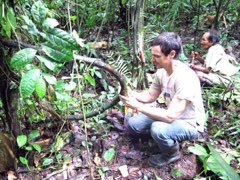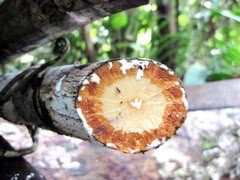 |
|
Luke Weiss environment.yale.edu |
 |
| Luke Weiss environment.yale.edu |
Translate this page:
Summary
Yoco, Paullinia yoco, is a tropical vine with stems growing up to 12cm in diameter. It can be found in South America. The sap obtained from the bark contain 2.73% caffeine and is used as a stimulating breakfast beverage. It is also taken medicinally against fever, nausea, and vomiting.
Physical Characteristics

 Paullinia yoco is an evergreen Climber growing to 15 m (49ft) by 2 m (6ft) at a medium rate.
Paullinia yoco is an evergreen Climber growing to 15 m (49ft) by 2 m (6ft) at a medium rate.
See above for USDA hardiness. It is hardy to UK zone 10. The flowers are pollinated by Bees.
Suitable for: light (sandy), medium (loamy) and heavy (clay) soils and prefers well-drained soil. Suitable pH: mildly acid, neutral and basic (mildly alkaline) soils. It can grow in semi-shade (light woodland) or no shade. It prefers moist soil.
UK Hardiness Map
US Hardiness Map
Synonyms
No synonyms are recorded for this name.
Plant Habitats
Edible Uses
Edible Parts: Inner bark Sap Stem
Edible Uses: Coffee Drink
The softer tissues of the bark, stems and wood are used to extract the white or brownish sap which has been shown to contain 2.73% caffeine. The native people in adjacent Colombia regularly used this product as a stimulating breakfast beverage[434 , 521 ]. The stem is cut into pieces 30 - 100cm long, and the epidermis, cortex, and phloem are rasped. The scrapings thus obtained are squeezed to express the caffein-bearing sap into cold water (hot or warm water is never used with yoco), the rasped tissues being then discarded. The liquid, of a cloudy milky-white or light chocolate-brown colour, is drunk cold. The beverage, which is taken early every morning, allays hunger and supplies muscular stimulation[476 ]. Lianas of Paullinia Yoco, which have a stout stem at least 8cm in diameter at the base, are utilized. Usually several trees must be felled before the liana falls to the ground. Starting at the root, the stem is then cut into pieces which may vary from 30 - 100cm in length. These pieces are stored in cool corners of Indian houses and can retain their stimulating properties for a month or even longer[928 ].
References More on Edible Uses
Medicinal Uses
Plants For A Future can not take any responsibility for any adverse effects from the use of plants. Always seek advice from a professional before using a plant medicinally.
Antibilious Febrifuge Malaria Stimulant
A beverage made from the stem (see edible uses), is taken medicinally as a febrifuge and as a curative for a bilious disease[476 , 928 ]. In addition to its use as a stimulant, yoco is employed, in larger dosages, as an anti-malarial febrifuge and as a medicine in the treatment of a bilious disease which is frequent in the Putumayo[928 ].
References More on Medicinal Uses
The Bookshop: Edible Plant Books
Our Latest books on Perennial Plants For Food Forests and Permaculture Gardens in paperback or digital formats.

Edible Tropical Plants
Food Forest Plants for Hotter Conditions: 250+ Plants For Tropical Food Forests & Permaculture Gardens.
More

Edible Temperate Plants
Plants for Your Food Forest: 500 Plants for Temperate Food Forests & Permaculture Gardens.
More

More Books
PFAF have eight books available in paperback and digital formats. Browse the shop for more information.
Shop Now
Other Uses
References More on Other Uses
Cultivation details
References Carbon Farming Information and Carbon Sequestration Information
Temperature Converter
Type a value in the Celsius field to convert the value to Fahrenheit:
Fahrenheit:
The PFAF Bookshop
Plants For A Future have a number of books available in paperback and digital form. Book titles include Edible Plants, Edible Perennials, Edible Trees,Edible Shrubs, Woodland Gardening, and Temperate Food Forest Plants. Our new book is Food Forest Plants For Hotter Conditions (Tropical and Sub-Tropical).
Shop Now
Plant Propagation
Seed -
Other Names
If available other names are mentioned here
Yoco, yoko.
Native Range
SOUTHERN AMERICA: Colombia (Putumayo (southeast)), Ecuador (Napo (east)), Peru (Loreto)
Weed Potential
Right plant wrong place. We are currently updating this section.
Please note that a plant may be invasive in one area but may not in your area so it's worth checking.
Conservation Status
IUCN Red List of Threatened Plants Status : This taxon has not yet been assessed

Growth: S = slow M = medium F = fast. Soil: L = light (sandy) M = medium H = heavy (clay). pH: A = acid N = neutral B = basic (alkaline). Shade: F = full shade S = semi-shade N = no shade. Moisture: D = dry M = Moist We = wet Wa = water.
Now available:
Food Forest Plants for Mediterranean Conditions
350+ Perennial Plants For Mediterranean and Drier Food Forests and Permaculture Gardens.
[Paperback and eBook]
This is the third in Plants For A Future's series of plant guides for food forests tailored to
specific climate zones. Following volumes on temperate and tropical ecosystems, this book focuses
on species suited to Mediterranean conditions—regions with hot, dry summers and cool, wet winters,
often facing the added challenge of climate change.
Read More
Expert comment
Author
R.E.Schult. & Killip
Botanical References
Links / References
For a list of references used on this page please go here
A special thanks to Ken Fern for some of the information used on this page.
Readers comment
| Add a comment |
|
If you have important information about this plant that may help other users please add a comment or link below. Only comments or links that are felt to be directly relevant to a plant will be included. If you think a comment/link or information contained on this page is inaccurate or misleading we would welcome your feedback at [email protected]. If you have questions about a plant please use the Forum on this website as we do not have the resources to answer questions ourselves.
* Please note: the comments by website users are not necessarily those held by PFAF and may give misleading or inaccurate information.
To leave a comment please Register or login here All comments need to be approved so will not appear immediately.
|
|